Composting in the city
In our current reality, where many community members are being asked to spend more time at home, there is a unique opportunity to adopt new practices in each of our “homesteads” that are good for our wellbeing and the health of our planet. Whether it’s cooking more meals at home, turning your living room into a yoga studio, or dare I say it…composting!—even if your “estate” is more compact, i.e. rental, apartment, condo, etc… Starting to compost at home may seem like something reserved for folks with acreage or at minimum a backyard. But there are a variety of options available to city dwellers who want to recycle more of their food scraps and other organic waste—which may be piling up more and more these days.
According to the EPA about 94% of the 38 million tons of food waste food we throw away in a year, ends up in a landfill. Likewise, more food reaches landfills than any other product we dispose of in our trash bins. This amounts to 22 percent of our landfills which in turn contribute to 20 percent of the total U.S. methane emissions. So there’s the doom and gloom, here comes the upside, composting at home can play an essential role in food waste reduction and efforts to divert organic waste from landfills.
The first step is collection:
Kitchen bin
The first step to composting at home is designating an indoor receptacle for collecting your food waste. Ideally, something that sits on your countertop and that you can easily toss scraps into while you cook. This doesn’t need to be fancy, although there are some more refined bins on the market (pictured), a one-gallon tub or pickle jar works well for daily use. You can take the scraps from your countertop container directly to your active compost bin or keep a week’s supply in something like a covered 5-gallon paint bucket underneath their sink (pictured). Some people store their daily waste in zip lock bags in the freezer.
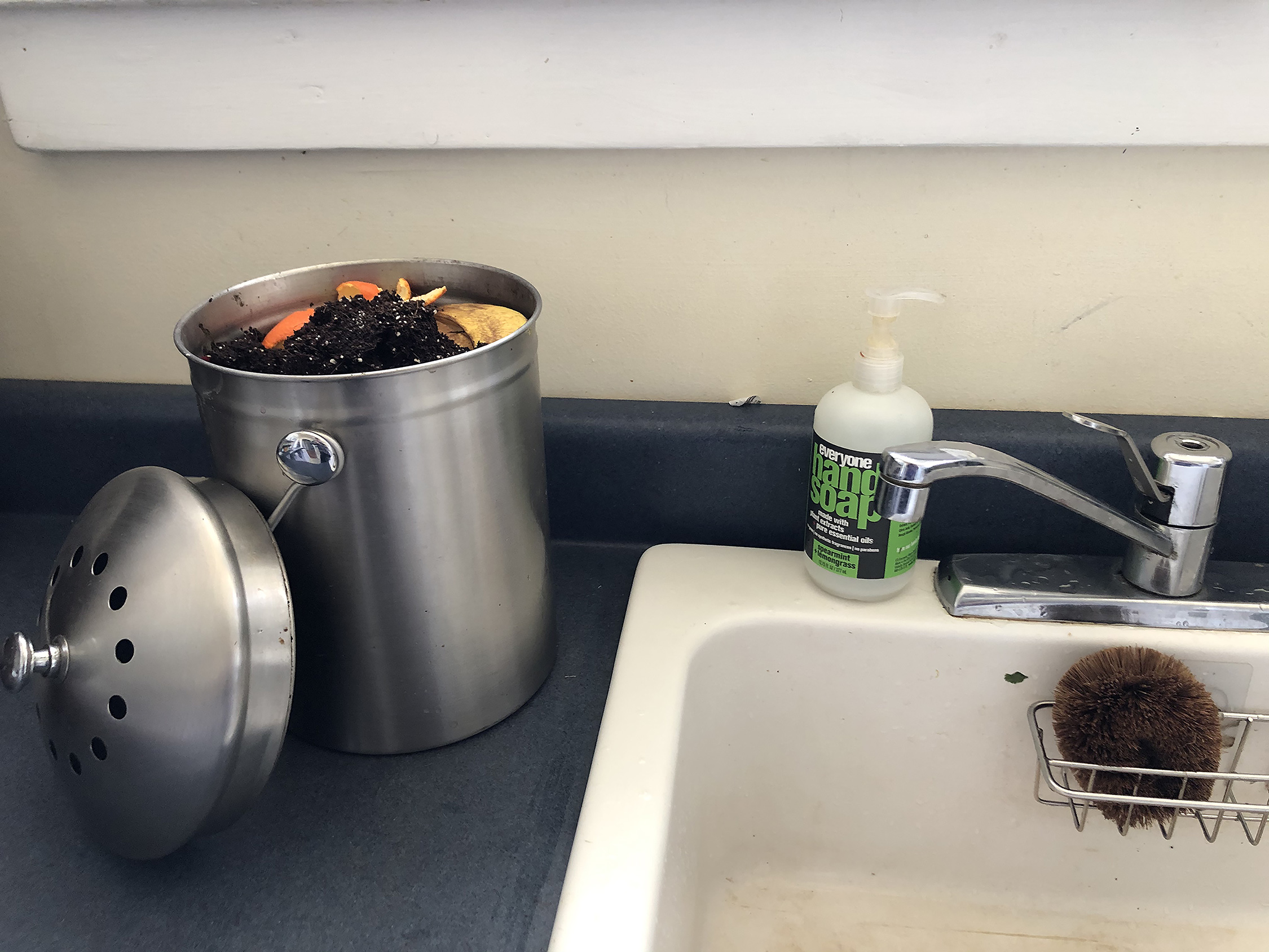
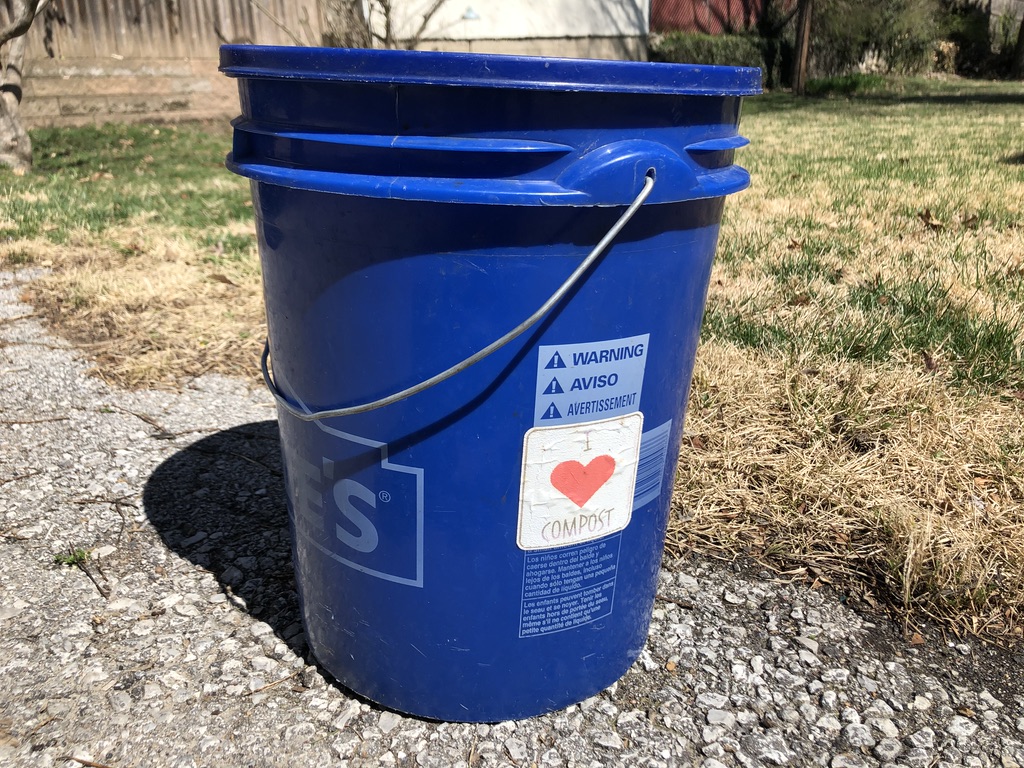
Here’s a list of some materials recommended for beginning composters:
- Fruit and vegetable scraps
- Washed eggshells
- Coffee ground, paper tea bags
- Residues from house plants
- Used potting soil
- Shredded newspaper, cardboard, non-glossy paper
Cooked kitchen waste that contains oil, fat, grease, meat, fish and/or dairy is best left out—especially if you plan to compost indoors.
Composting the waste:
Alright, now that you have your collected material, what can you do with it? At its most basic level, composting is the practice of decomposing solid organic waste into amorphous soil-like material known as humus. There are a variety of different physical and biochemical methods to execute the composting process.
Outside bins
Of course, there are the more traditional large outdoor bins that may be suitable for a household with a backyard or shared between the community at a local garden. Designs for constructing these lumber and wire type bins at home are available in K-State’s Guide to Making Compost: https://bookstore.ksre.ksu.edu/pubs/mf1053.pdf or you can visit Kansas City Community Gardens’ “Find A Garden Map” (http://kccg.force.com/GardenMap) to find a garden near you and inquire about whether they accept compost donations. There are even some local farms that accept food scraps: http://www.urbavorefarm.com/compost/
And there are a variety of convenient premade bins available for order. These are typically smaller and require less manual turning or stirring of the compost. Thanks to a donation from Johnson County Solid Waste Team we recently installed the passive solar Green Cone Composter at the WIC Garden (pictured): http://www.greenconeusa.com/green-cone-solar-food-waste-digester.html We’ll provide some updates and evaluation on this unit over the next year. My co-worker Dennis Patton showcases a few other premade bins in this Kansas Healthy Yards video: https://kansashealthyyards.org/index.php?option=com_allvideoshare&view=video&slg=composting-choosing-a-bin&Itemid=340
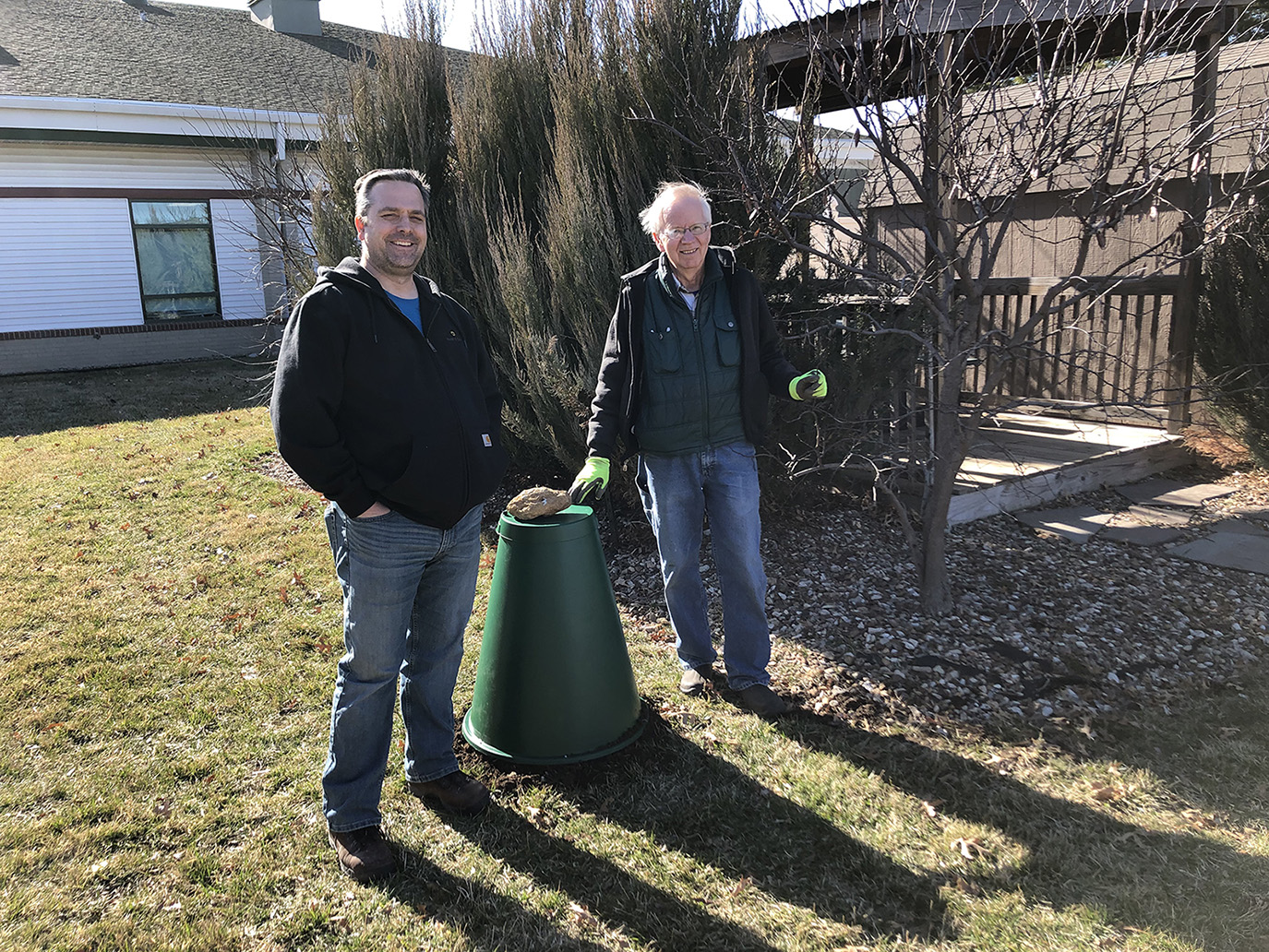
Craig Wood (Solid Waste Mgmt. Coordinator) and Anthony Wittman (WIC Garden Volunteer) install this handsome “Green Cone”
Indoor options
Composting in containers/indoors is a challenge because the environment lacks the perfect mix of light, water, air, and microorganisms that make composting an everyday thing outside in nature. But rest assured indoor composting can be achieved, but it benefits from incorporating some of the flora (beneficial microbes) and/or fauna (earthworms) present in the outdoor environment. Here are two of the most common indoor methods:
Worm composting otherwise known as vermicomposting is an excellent method to compost indoors. With nothing more than a Rubbermaid type bin with a few drilled holes (pictured) or a premade unit like the “Worm Factory” in our Master Gardener Hotline, the right balance of organic scraps, and a couple thousand red wiggler earthworms (Eisenia fetida) you can quickly turn food waste into black gold. Check out Douglas County’s factsheet on building your own worm compost bin: https://www.douglas.k-state.edu/docs/lawnandgarden/Vermicomposting.pdf 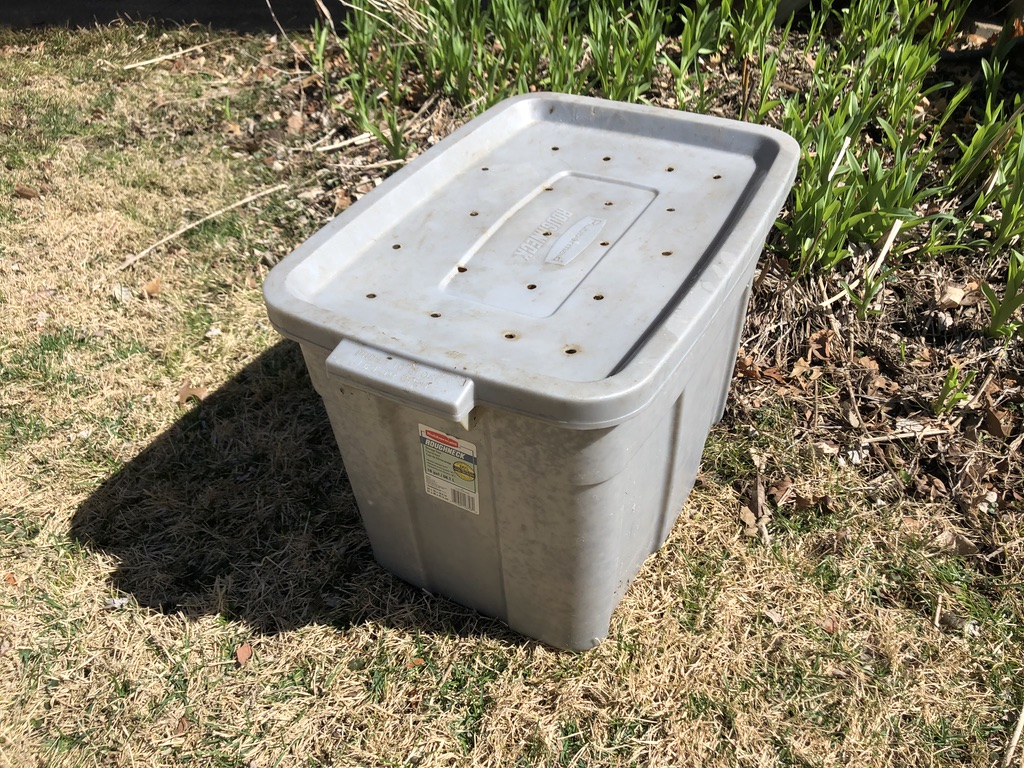
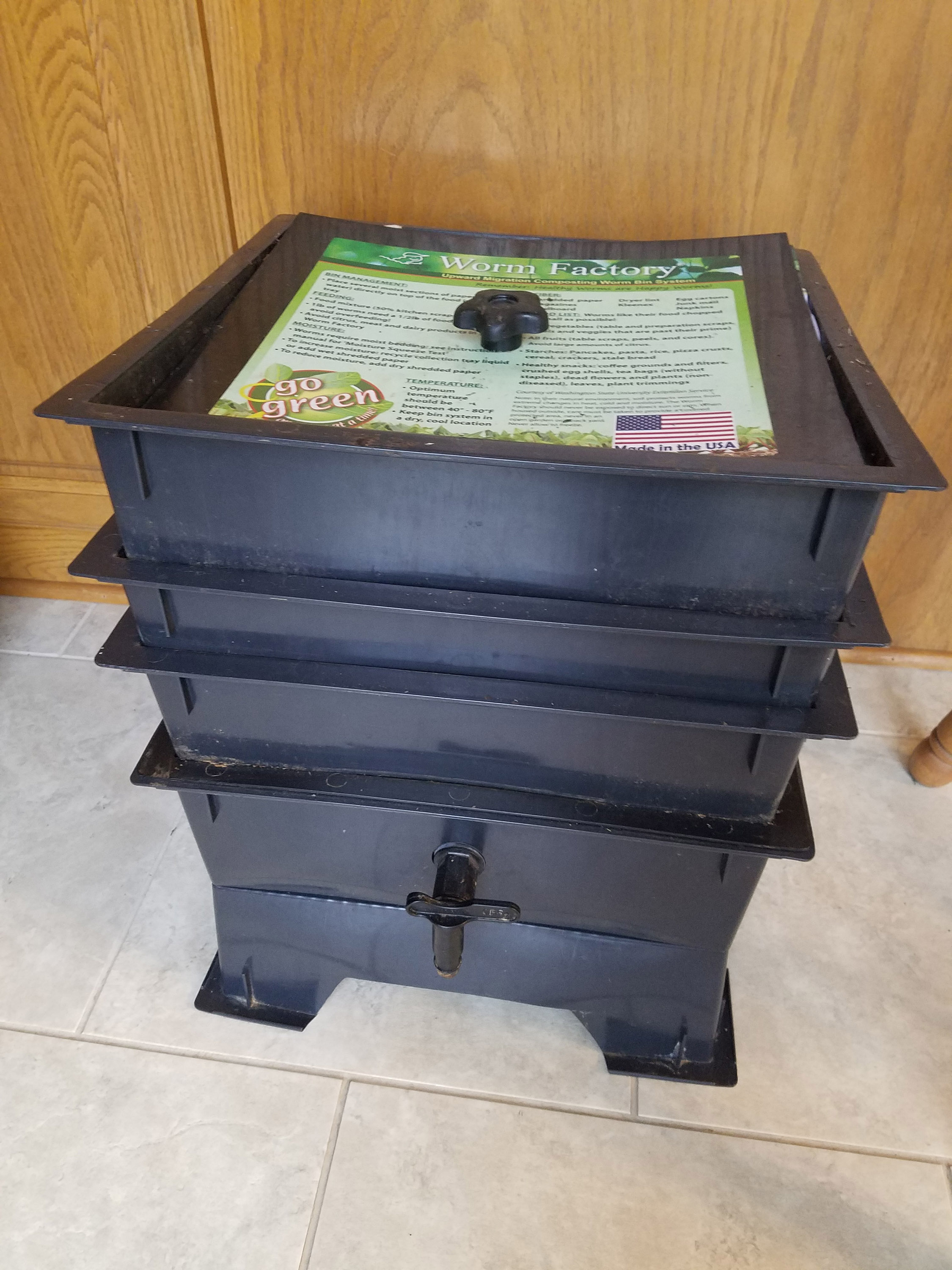
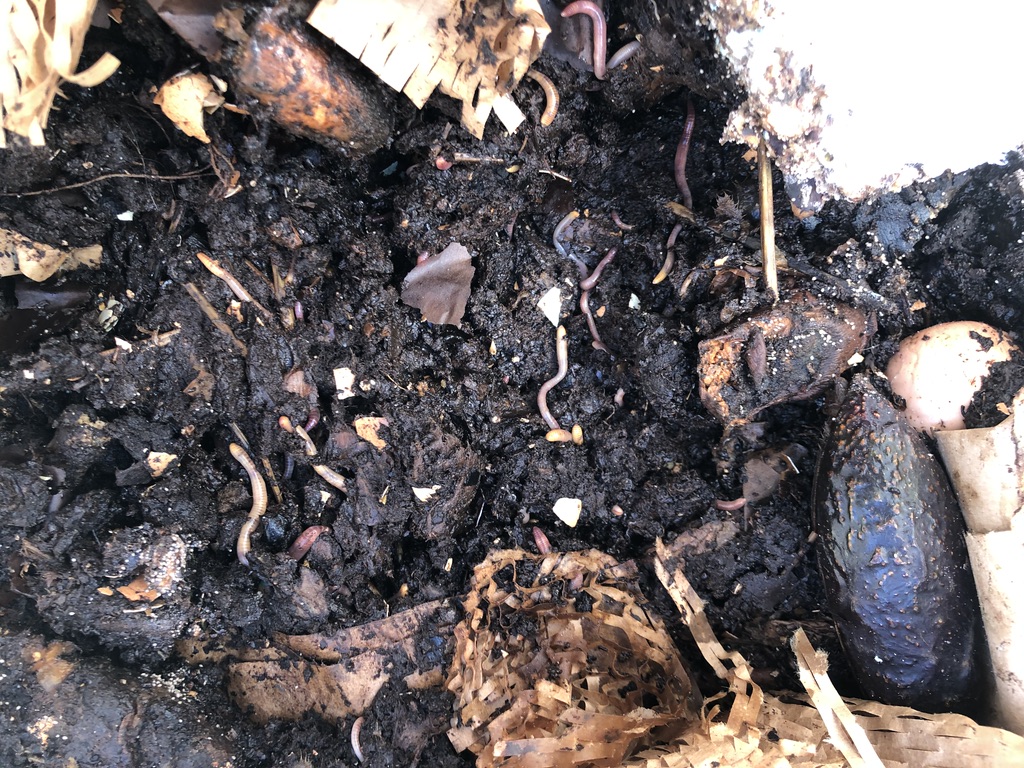
Worm compost in action!
Bokashi is a composting method that originated in Japan, and the word means fermented organic matter. It requires the use of a beneficial yeast and bacteria solution to ferment the food waste and effectively pickle the materials inside. These beneficial microbes outcompete the other decay organisms and allow for the material to quickly decompose fully when incorporated outside. This method is done in a sealed container (often a five-gallon bucket) so it takes up little space and creates no odor (as long as the lid is on). Moreover, it will safely compost items like meat, bones, and oily things. University of New Mexico Extension has a how-to guide on building your own bokashi compost bin at https://bernalilloextension.nmsu.edu/mastercomposter/bokashi.html
Pick-up services
Several businesses offering compost pick up have sprung up over the last few years serving Johnson County and Kansas City residents—some municipalities in the county are piloting these services as we speak. Individuals outside of these current pilot zones can register for individual service with a quick internet search. Most of these businesses charge a small fee and will pick up your food waste on a certain schedule and often provide finished compost to their clients at no or low cost.
Using your finished product:
Lastly, the finished compost has many applications, fertilization and soil improvement for lawn and garden, potting mix for seedlings and container plants, and mulch for shrubs and young trees. Moreover, it will immediately help decrease the odor of trash bins in the home, decrease food waste and carbon emissions in the community, increase your physical activity and make your urban “homestead” more resilient in trying times. Oh yeah and if you’re kinda weird like me, you’ll have fun doing it! For more resources on composting visit our webpage dedicated to the subject: https://www.johnson.k-state.edu/lawn-garden/composting.html
